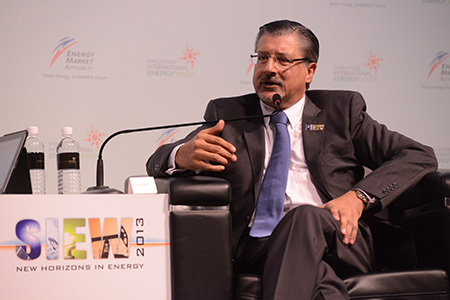
IRENA Director-General Mr. Adnan Amin – a different interpretation of “resurgence”.
A diverse panel exchanged views on “The Resurgence of Fossil Fuels” at the Singapore Energy Summit today – with the benefits of subsidies also an item high on their agenda.
Mr. Adnan Amin, Director-General of International Renewable Energy Agency (IRENA), told the audience that he does not agree that the new and previously unexpected discoveries of oil and gas resources indicate any such resurgence. Instead, he believes, the industry is simply seeing “increasingly positive technological development”.
For example, he explained, “the technology that led to the emergence of shale gas, which is increasing the timeline with which we are looking at fossil fuels”.
Mr. Mark McArdle. Minister for Energy and Water Supply in Queensland, Australia, stated that many governments “certainly accept that there is a place for renewable energy” in their fuel mix. However, he added that renewable energy must be commercially viable, and compete against other forms of energy.
He said governments need to plan on a long-term horizon in order to take into account all factors, including changes in technology.
Mr. McArdle also warned against subsidies, pointing out that countries such as Spain and the United Kingdom are facing massive deficits due to the subsidies.
Mr. Amin also expressed concerns about subsidies and the distortions they can cause in the market. He said subsidies may not achieve the policy goal or benefit the targeted consumers as intended. He said a number of governments are considering phasing out such subsidies. Mr. Amin further commented that subsidies may not be required if the market sends the right signal for investment. In some countries where electricity demand is growing, such as Latin America and Africa, there are major investments in renewable energy even without subsidies.
Mr. Amin mentioned that there is “an almost universal conception that renewable energy is too expensive” but said that In a recent study by IRENA, it concluded that the cost of solar energy has decreased by two-thirds over the last four to five years.
The study also found that the cost of onshore wind energy has fallen below that of coal in South Africa and that of gas in Brazil. Hence, the cost of the different energy resources are changing quickly and these should be taken into account by the various stakeholders in the industry. He said that subsidies can have benefits in driving investment during the infancy stage of a new technology.
Dr. Weerawat Chantanakome, Chief Executive Officer of Brunei National Energy Research Institute (BNERI) concluded that perhaps subsidies can be used in the initial stage of a new technology to encourage initial investment in the technology. He also added that gas and renewable energy do not have to be viewed as substitutes for each other but could go hand-in-hand in their expansion.
BY : Lee Guo Rui